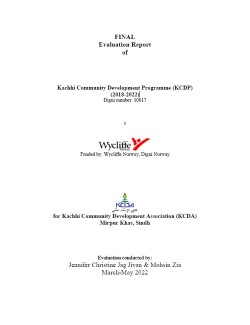Final Evaluation Report of Kachhi Community Development Programme (KCDP) (2018-2022)
About the publication
- Published: March 2022
- Series: Evaluation report
- Type: --
- Carried out by: Jennifer Christine Jag Jivan, Moshin Zia
- Commissioned by: --
- Country: Pakistan
- Theme: Human rights, Civil society, Health
- Pages: 52
- Serial number: --
- ISBN: --
- ISSN: --
- Organization: Wycliffe Norway
- Local partner: Kachhi Community Development Association (KCDA)
- Project number: QZA-18/0159-466-469

Background: The Kachhi people number approximately a half a million people and are found in the border region between India and Pakistan. They are predominately Hindu and are ethnic and religious minorities in the regional context of Pakistan. They have traditionally faced social and economic discrimination and have far-reaching disadvantages as a result.
Purpose/objective: The vision of KCDP has been to empower the Kachhi people in a variety of ways such as improving their standards of health through clean water initiatives, promoting mother tongue based education in private schools, vocational training, saving groups, and linking the community together through a system of hierarchical networks, to name just a few of their activities. Overall, the scope of KCDP’s vision is wide and encompassing, and seeks to boost the community in a holistic way.
Methodology: The evaluation conducted was a comprehensive examination of the KCDP project and was largely based on field visits, interviews, conversations, and consultations with significant members of the stakeholders and core staff. These qualitative findings were viewed and interpreted with special consideration given to the RBM logframe.
Key findings: The project design lays a good foundation for the Kachhi community to cooperate and enable one another and is perceived to be “highly relevant”. The network structure has an intrinsic hierarchy to it, which is simultaneously strategic and a liability. The quality and impact of the various branches within the network can often be tied to the personal competence of the animators; training and capacity building of animators, as well as increased connectedness to the office staff need to be areas of focus in the future. Education and health initiatives are foundational necessities to curb generational poverty.
KCDP’s work has improved the quality of living for many of the Kachhi living in project’s scope; however, the reach is limited and there are still many villages within the target areas that lack schools. Motivation and achievement levels vary amongst the schools, so quality assurance must be prioritized to shorten the gap and help struggling schools.
Kachhi men and women are becoming more independent and empowered through the social initiatives of the project. Savings groups and Self Help Groups have promoted economic stability, but there remains much work to be done before communities are self-reliant. There is a need for greater effectiveness and coordination with more robust evaluation and strategic planning done along the way.
The organizational structures and frequent involvement from the Board are positive. Additionally, the evaluators were “genuinely impressed by the financial process” of KCDP. There was shown to be good management of finances that provides a good platform by which to forecast and plan effectively. Financial dealings within the organization illustrate good transparency, and financial staff are seen as capable and hardworking.
Recommendations: The model and project design have enabled KCDP to be a force of change and social betterment to the Kachhi people. In order for KCDP to flourish, it will need to undergo consolidation efforts to build and strengthen existing structures. This is true both on the organizational level as well as with project implementation. The network of villages also needs strengthening, wherein there is a holistic focus on good communication and sharing of expertise between animators, the community, and the KCDP staff. Monitoring, evaluation, and data collection/assessment needs to be carefully assessed and should be the guideline for plotting a future strategy. Structures to ensure good financial management as well as a comprehensive fundraising strategy must be intensified.
Comments from Digni:
This evaluation was conducted in the final year of the third 5-year period of the Kachhi Community Development Programme in the Sindh Province of southeastern Pakistan. The evaluators were a team of two non-partisan, qualified individuals who traveled to the project area to observe, evaluate and assess the strengths and impact of the current project as well as its shortcomings.
Evaluators note that the partner organization has several family members employed in the project and point out the elevated risks this represents in operation. Digni has on several occasions addressed this in dialogue with WYC to ensure that necessary procedures and routines are applied to reduce related risks. However, the evaluators point out that the handling of family ties in the organisation requires deep consideration.
Wycliffe has announced to Digni that they do not wish to apply for new projects with KCDA in Pakistan. This decision is justified by an overall assessment of the risks involved regarding the context, capacity and competence of the local partner.
